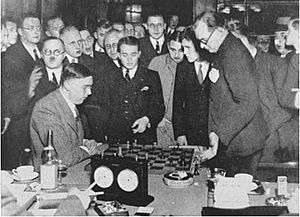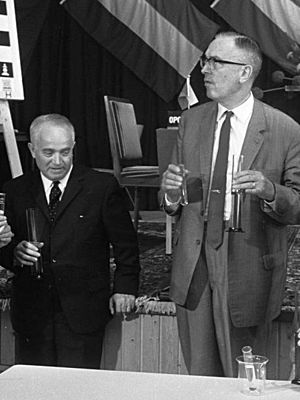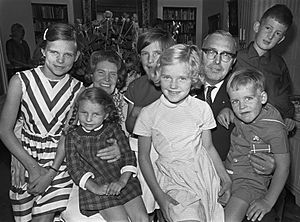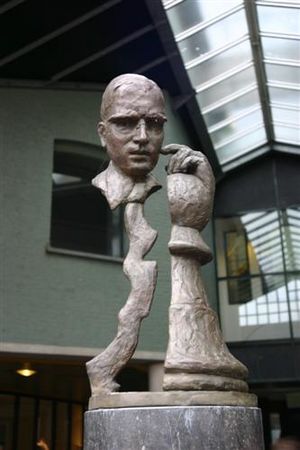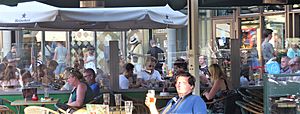Max Euwe facts for kids
Quick facts for kids Max Euwe |
|
|---|---|
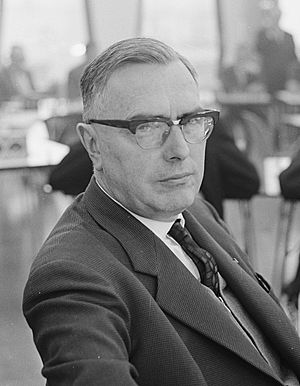
Euwe in 1963
|
|
| Full name | Machgielis Euwe |
| Country | Netherlands |
| Born | May 20, 1901 Amsterdam, Netherlands |
| Died | November 26, 1981 (aged 80) Amsterdam, Netherlands |
| Title | Grandmaster (1950) |
| World Champion | 1935–37 |
| Peak rating | 2530 (May 1974) |
Machgielis "Max" Euwe (born May 20, 1901 – died November 26, 1981) was a famous Dutch chess player. He was also a mathematician, a writer, and a leader in the world of chess. Max Euwe became the fifth World Chess Champion. He held this important title from 1935 to 1937. Later, he became the President of FIDE, which is the World Chess Federation, from 1970 to 1978.
Contents
Early Life and Learning
Max Euwe was born in Amsterdam, Netherlands. He loved to learn, especially about mathematics. He studied math at the University of Amsterdam. In 1926, he earned his highest degree in mathematics.
After his studies, Euwe became a math teacher. He taught in the city of Rotterdam first. Later, he taught at a girls' school in Amsterdam. After World War II, Euwe became very interested in computers. He became a professor of computer programming. He taught at universities in Rotterdam and Tilburg. He stopped teaching in 1971.
Euwe even used his math skills to study chess. He showed that, based on the rules at the time, a chess game could theoretically go on forever!
Starting His Chess Journey
Max Euwe started playing chess tournaments at a young age. When he was just 10 years old, he played in his first tournament and won every game!
He won almost every Dutch chess championship he entered from 1921 to 1952. He won the title again in 1955. His 12 championship titles are still a record in the Netherlands. In 1928, he became the world amateur chess champion. He won this title in The Hague.
Euwe got married in 1926 and started a family. This meant he could only play chess during school holidays. So, he had fewer chances to play in big international tournaments. But when he did play, he did very well. He played against some of the best players in the world. He played a practice match against Alexander Alekhine in 1926–1927. He also played against José Raúl Capablanca in 1931.
In 1932, Euwe played a match against Salo Flohr and it ended in a tie. He also finished second with Flohr in a big tournament in Bern. These results showed that Euwe was one of the top players. He was seen as a strong challenger to the world champion, Alekhine. At the Zürich 1934 tournament, Euwe again finished second with Flohr. He even beat Alekhine in their game there.
Becoming World Champion
In 1933, Max Euwe challenged Alexander Alekhine for the World Chess Championship. Alekhine accepted, and the match was set for October 1935. Before the match, a journalist asked Capablanca what he thought. Capablanca said that Euwe's game was "clear and straightforward" and "more evenly balanced." Euwe himself said he felt both hopeful and nervous about the match. He noted that their previous games had been very close.
On December 15, 1935, after 30 games, Euwe achieved a huge victory. He played the games in 13 different cities across the Netherlands. Euwe defeated Alekhine by a score of 15½ to 14½. This made him the fifth World Chess Champion. Alekhine started strong, leading by three games. But Euwe fought back and won the match. His win made chess very popular in the Netherlands. This was also the first world championship where players had "seconds." These were helpers who analyzed the game during breaks.
Many people were surprised by Euwe's win. He himself thought it would be hard to beat Alekhine. But later, many former world champions, like Garry Kasparov, looked at the match. They all agreed that Euwe deserved to win. They said the quality of play was very high for a world championship.
Euwe showed he was a worthy champion at the Nottingham 1936 tournament. He finished third, just behind Mikhail Botvinnik and Capablanca. He was also ahead of Alekhine. Chess expert Reuben Fine said that Euwe's strength grew during this time. He said that while Euwe might not have been as dominant as past champions, no one was better than him during this period.
Euwe lost his title back to Alekhine in a rematch in 1937. This match was also played in the Netherlands. Alekhine won by a score of 15½ to 9½. The match was close at first, but Euwe's play weakened near the end. He lost four of the last five games. Fine, who helped Euwe, thought it was due to stress.
Euwe and Alekhine played 86 competitive games in total. Alekhine won more games overall. But the two world title matches were the most important part of Euwe's chess career.
Later Chess Career
In 1938, Euwe played in the AVRO tournament in the Netherlands. This event featured the world's top eight players. Euwe finished tied for fourth place with Alekhine and Samuel Reshevsky. Euwe also helped organize this big tournament.
After Alekhine passed away in 1946, some people thought Euwe should be the world champion. This was partly because he finished second in the big Groningen tournament in 1946. But Euwe agreed to play in a special tournament to choose the new champion. This was the World Chess Championship 1948. At 47 years old, Euwe was older than the other players. He finished last in this tournament. In 1950, FIDE officially gave Euwe the title of international grandmaster. He won an international tournament in Gijón in 1951.
Euwe's last major tournament was the Candidates' Tournament in Zürich in 1953. He started well but got tired in the second half and finished near the bottom.
Euwe played for the Netherlands in seven Chess Olympiads. These are team tournaments for countries. He played from 1927 to 1962, always on the top board. He won a bronze medal in 1937 and a silver medal in 1958. In 1957, Euwe played a short match against 14-year-old Bobby Fischer. Fischer later became a world champion. Euwe won one game and drew another against him.
Throughout his career, Euwe won 102 first prizes in tournaments. Many of these were local events. In 1964, he became a computer science professor at Tilburg University.
FIDE President
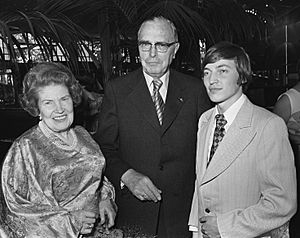
From 1970 to 1978, Max Euwe was the president of FIDE. He was 69 years old when he started this important job. As president, he always tried to do what he thought was right. This sometimes caused disagreements with the USSR Chess Federation. The Soviet Union had many strong players and contributed a lot to FIDE.
Here are some important things Euwe did as FIDE President:
- He helped Bobby Fischer play in the World Chess Championship 1972 match against Boris Spassky. Fischer became the first non-Soviet champion since World War II. Euwe believed it was important for chess that Fischer had a chance to play for the title.
- In 1976, Viktor Korchnoi, another strong player, asked for safety in the Netherlands. Euwe supported Korchnoi and opposed Soviet efforts to stop him from challenging Anatoly Karpov for the title in 1978.
- Also in 1976, Euwe supported FIDE's decision to hold the Chess Olympiad in Israel. The Soviet Union did not recognize Israel as a country.
Euwe faced many challenges during his time as president. But most people think he did a great job. Boris Spassky, who nominated Euwe for the job, said Euwe was "the man for the job." Anatoly Karpov said Euwe was a very good FIDE President. Garry Kasparov noted that Euwe could not have known the problems that would come from FIDE having so many new members. Viktor Korchnoi called Euwe the last honorable president of FIDE. Yuri Averbakh, a Soviet chess official, said Euwe was "without a doubt, the best President FIDE ever had."
Max Euwe passed away in 1981 at the age of 80. He was loved around the world for his many contributions to chess. As FIDE President, he traveled a lot and brought many new countries into the organization.
Euwe's Chess Style
Euwe was known for his logical way of thinking in chess. He also knew a lot about chess openings. He helped develop new ideas in chess theory. Even though he was logical, his matches with Alekhine were full of exciting tactical moves. This might be because Euwe was very good at calculating complex moves if he thought they were logical. However, he sometimes struggled to recover from bad positions.
Some experts said Euwe was not as original as other champions. They also said he sometimes lacked the mental toughness needed for a world champion. But he was much stronger than most grandmasters. Vladimir Kramnik said Euwe was like Mikhail Botvinnik in how he prepared for games. Euwe was also a keen sportsman, so he was usually in good physical shape.
Chess Books by Euwe
Max Euwe wrote over 70 chess books. This is more than any other World Champion! Some of his most famous books include The Road to Chess Mastery and Judgement and Planning in Chess. Another book, Practische Schaaklessen, is considered one of the best chess books ever. He also wrote a book for children called Oom Jan leert zijn neefje schaken (Uncle Jan teaches his nephew chess).
Legacy and Honors
In Amsterdam, there is a square named Max Euwe Plein (Max Euwe Square). It has a big chess set and a statue of him. The 'Max Euwe Stichting' (Max Euwe Foundation) is located there. It has a Max Euwe museum and a large collection of chess books.
Euwe received several honors from the Netherlands:
- In 1936, he was made an Officer of the Order of Orange-Nassau.
- In 1979, he was promoted to Commander of the Order of Orange-Nassau.
Images for kids
-
Euwe and his wife meeting Anatoly Karpov in 1976
See also
 In Spanish: Max Euwe para niños
In Spanish: Max Euwe para niños
 | Dorothy Vaughan |
 | Charles Henry Turner |
 | Hildrus Poindexter |
 | Henry Cecil McBay |


